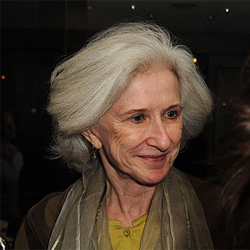More years pass and the book does not leave the drawer.
According to our author the book does not begin but opens on
a typewriter near a radiator. The typing machine has been
aimed at the window overlooking a park. It’s been oiled and
blown out. At heart it is domestic as an old washer with them
white sheets coming off the platen. In the missing teeth much
has been suppressed. In the space and a half, regrettable things
have been said. Nothing can be taken back. The author wanted
this book to be friendly, to say, Come up on the porch with
me, I’ve got peaches; I don’t mind if you smoke. It would be written
in the author’s own voice. A dedication was planned to
Tyrone and Tina whose names the author read in a sidewalk on
Broad. The machine’s vocation was to type, but its avocation
was to tell everyone up before light, I love you, I always will; to
tell the sisters waiting on their amniocenteses, Everything’s
going to be fine. And to make something happen for the
hundreds of Floridians betting the quinella. It would have
dinner ready for people on their feet twelve house a day. And
something else for the ones making bread hand over fist, the
gouging s-o-bs. But the book was too dependent. Women were
scattered across pages who loved the desert, but moved into
town to meet a man. The women, understand, weren’t getting
any younger. Some of these women were pecking notes into the
text when the author was out walking. One note said: John Lee
you’re still in my dreambooks, et cetera. The author had no
foresight. In previous drafts the good died right off like notes
on an acoustic guitar. Others died of money, that is, fell of
odorless, invisible, utterly quiet wounds. The work recorded
whatever it heard: dog gnawing its rump, the stove’s clock, man
next door taking out his cans, and things that went on farther
down, below buildings and composts, all with the patience of a
dumb beast chewing grass, with the inconsolable eyes of the
herd. Basically the book was intended as a hair-raising
document of the organisms. Thus and so the book opens: I have
been meaning to write you for a long long time. I’ve been
feeling so blue John Lee.
Notes on the Poem
So much is packed with deceptive ease into the flowing, colloquial, wise and wisecracking poem "The Next to Last Draft" by the late C.D. Wright from her 2003 Griffin Poetry Prize shortlisted collection Steal Away, so much so ... ... that it encompasses subjects from two other recent Poem of the Week selections. The poem is another nod to Ars Poetica, as discussed with the poem "Night-black silver, January's luminous", composed in Danish by Ulrikka S. Gernes, translated into English by Canadian poet/translators Per Brask and Patrick Friesen. The poem is also immensely enhanced by the singular delivery of the poet, as we observed with "Faceless" by Tongo Eisen-Martin. Like the Gernes/Brask/Friesen poem, Wright contemplates the process of writing poetry on a ruefully intimate scale, starting with: "More years pass and the book does not leave the drawer." This explanation of the "art of poetry" ranges through the mechanics of the artist's tools to the wanderings of the artist's attention to thoughts that might or might not further what is being created. As Gernes' narrator scribbled in a newspaper margin, Wright's narrator was making notes, too, perhaps a little more distractedly: "Some of these women were pecking notes into the text when the author was out walking. One note said: John Lee you're still in my dreambooks, et cetera." Let's remind ourselves of C.D. Wright's much-missed voice, unforgettably offering a zinger like this: "I told him I’ve got socks older than her but he would not listen" ... and then imagine that voice bringing these words to crackling life: "The work recorded whatever it heard: dog gnawing its rump, the stove's clock, man next door taking out his cans, and things that went on farther down, below buildings and composts, all with the patience of a dumb beast chewing grass, with the inconsolable eyes of the herd." That voice, applied to those words ... will, oh my, be the last word indeed on the art of the "art of poetry", Ars Poetica.
